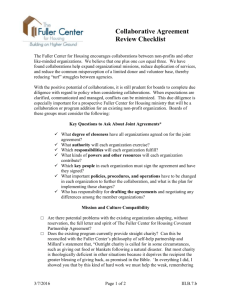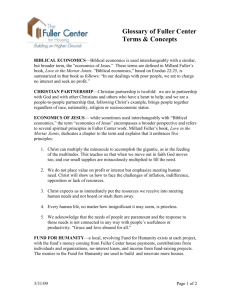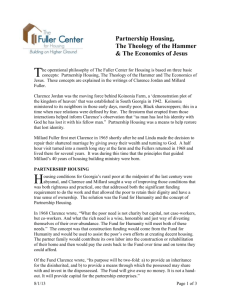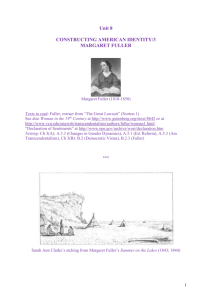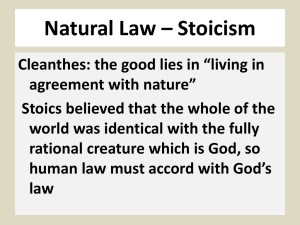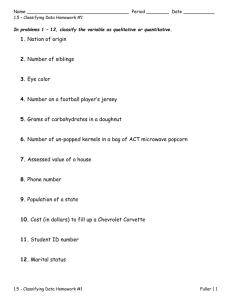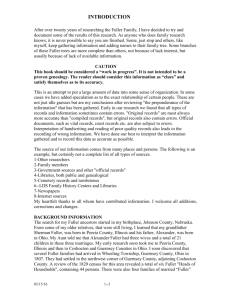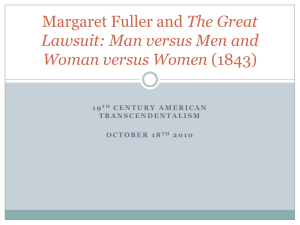Use of Government Funds - The Fuller Center for Housing
advertisement
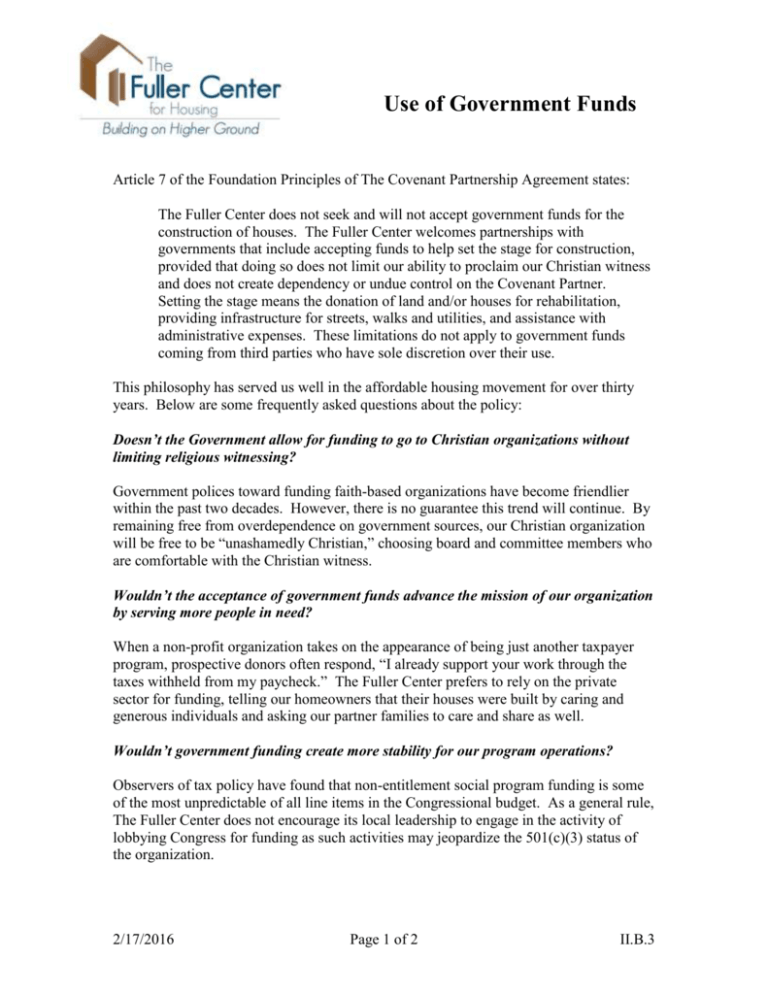
Use of Government Funds Article 7 of the Foundation Principles of The Covenant Partnership Agreement states: The Fuller Center does not seek and will not accept government funds for the construction of houses. The Fuller Center welcomes partnerships with governments that include accepting funds to help set the stage for construction, provided that doing so does not limit our ability to proclaim our Christian witness and does not create dependency or undue control on the Covenant Partner. Setting the stage means the donation of land and/or houses for rehabilitation, providing infrastructure for streets, walks and utilities, and assistance with administrative expenses. These limitations do not apply to government funds coming from third parties who have sole discretion over their use. This philosophy has served us well in the affordable housing movement for over thirty years. Below are some frequently asked questions about the policy: Doesn’t the Government allow for funding to go to Christian organizations without limiting religious witnessing? Government polices toward funding faith-based organizations have become friendlier within the past two decades. However, there is no guarantee this trend will continue. By remaining free from overdependence on government sources, our Christian organization will be free to be “unashamedly Christian,” choosing board and committee members who are comfortable with the Christian witness. Wouldn’t the acceptance of government funds advance the mission of our organization by serving more people in need? When a non-profit organization takes on the appearance of being just another taxpayer program, prospective donors often respond, “I already support your work through the taxes withheld from my paycheck.” The Fuller Center prefers to rely on the private sector for funding, telling our homeowners that their houses were built by caring and generous individuals and asking our partner families to care and share as well. Wouldn’t government funding create more stability for our program operations? Observers of tax policy have found that non-entitlement social program funding is some of the most unpredictable of all line items in the Congressional budget. As a general rule, The Fuller Center does not encourage its local leadership to engage in the activity of lobbying Congress for funding as such activities may jeopardize the 501(c)(3) status of the organization. 2/17/2016 Page 1 of 2 II.B.3 Furthermore, the red tape and administrative burdens, family selection requirements and construction completion timelines mandated by many programs often make the acceptance of government funding uneconomical. What does “setting the stage” mean specifically? The Fuller Center welcomes government funding earmarked for land, development of streets and utilities, environmental impact studies and the in-kind donation of old houses that need to be rehabilitated. The in-kind donated houses should not have excess square footage that would violate the spirit of “simple, decent, affordable housing.” The acceptance of government funds to hire professional lead and asbestos removal subcontractors is interpreted as a “setting the stage” activity. Can our Covenant Partnership enter into a collaborative agreement with another nonprofit who accepts government funding? For example, can we send our Fuller Center volunteers to build a house funded by a Community Housing Development Organization (CHDO)? Yes, with careful discernment by the local boards of directors of the collaborating organizations, assuring that no strings are attached that violate the core principals of the Fuller Center for Housing Covenant Partnership Agreement. We encourage our local leadership to review the “Collaborative Agreement Checklist” found in our online US Covenant Partner Operations Manual and to determine who would be liable as the general contractor for the supervision and safety of the volunteers and to make sure proper accident and liability insurance coverage is in place. Completed product warranties are another liability concern to review. Perhaps a wiser course of action would be to concentrate on building up The Fuller Center by taking on additional projects rather than engaging in collaborative endeavors. But the final decision should be a local one. There may be a compelling reason to do a collaborative project. Can our Covenant Partnership accept government funding for the construction of wheelchair ramps and other accessible housing improvements? Yes, with careful discernment by the local board of directors to make sure that the funding source has no strings attached that violate the core principles of the Fuller Center for Housing Covenant Partnership Agreement and The Greater Blessing Program homeowner repayment guidelines. 2/17/2016 Page 2 of 2 II.B.3
